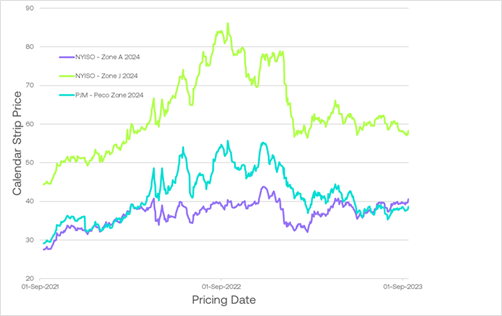Smartest Insight | Issue 134

Our weekly company round-up covers the key market and industry news in one place, so you don’t have to look any further to stay ahead.
September 13, 2023
Market Update:
Storage gain for week ending September 1st was an injection of 33 BCF. This was lower than expected causing a $0.10/MMBTU for prompt month gas up to $2.68/MMBTU. Prices continued to hover in the $2.60 range until yesterday's news on the expectation of lower production as we head into maintenance season. The prompt has not been hovering in the $2.70 range.
Our hopes of $2 gas are slowly fading as the market looks for any news to push it up. The National Weather Service predicts hotter than normal temperatures from NM, CO, WY, and MT eastward to the Atlantic making up approximately 3/4 of the country. We are right in the middle of hurricane season with four active storms to watch. So far there have been a total of 15 named storms this season. Hurricane season ends November 30th.
For the week ending September 8th, storage expectation is for an injection between +50 and 54 BCF.

Regulatory Report:
G20 establish commitment to renewables
G20 nations met in New Delhi and committed to tripling global renewable energy capacity while recognizing the need for a yearly $4 trillion investment to accelerate the energy transition. India announced a new renewable funding initiative with the US and launched a global biofuels alliance with the US and Brazil. The G20, representing over 75% of global trade, released a declaration focusing on clean, sustainable, and inclusive energy transitions to achieve climate goals and balanced growth.
Leaders agreed to encourage the tripling of global renewable energy capacity by 2030 and expressed ambition on carbon abatement and removal technologies. They acknowledged the financial requirements, including $5.8-$5.9 trillion for developing countries' contributions and $4 trillion annually for clean energy technologies to achieve net-zero emissions by 2050.
Additionally, leaders pledged to promote hydrogen production with renewables and low-emission technologies, work towards global market standardization, and support clean hydrogen trade. They aimed for a successful global emissions stock take at COP28 to enhance climate action. The declaration also highlighted the importance of carbon markets and the need for carbon pricing mechanisms.
India and the US established investment platforms to advance renewable energy projects, while India launched the Global Biofuels Alliance with international participation. This declaration marks a significant step towards addressing climate change and promoting sustainable energy practices on a global scale.
RGGI's Auction 61 Achieves 15-Month High Clearing Price Amid Program Review and State Uncertainty
The Regional Greenhouse Gas Initiative (RGGI) recently conducted Auction 61, where the clearing price for carbon dioxide allowances reached its highest point in 15 months at $13.85 per short ton. This represented an 8.8% increase compared to the previous quarter. Bids during the auction ranged from $2.50 to $20 per allowance.
RGGI is planning a program review, with a public meeting scheduled for September 26 to discuss and gather feedback on the CO2 budget trading program's successes and impacts. The results of this review will lead to a draft model rule to be released in the fall. If the timeline holds, member states will have until 2025 to adopt new program elements.
Virginia, which had the most allowances for sale in Auction 61, has faced uncertainty regarding its participation in RGGI since a change in leadership. While the state initially planned to leave RGGI, a lawsuit has challenged this decision, leaving its status in flux.
Meanwhile, other states like Pennsylvania and North Carolina are considering their participation in RGGI, with some legislative hurdles to overcome. RGGI, a collaboration among 12 New England and Mid-Atlantic states, aims to reduce carbon emissions from the power sector, and it became the first mandatory cap-and-trade program for carbon emissions in the US in 2009.
Auction 61 saw more than 21.9 million CO2 allowances sold, with compliance-oriented entities making up a significant portion of the buyers. Despite the narrowing gap between the clearing price and the cost-containment reserve trigger price, stricter caps may be needed to significantly impact prices in the RGGI market.
